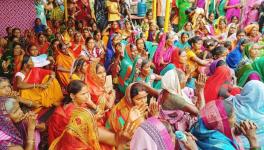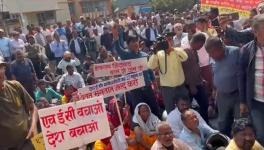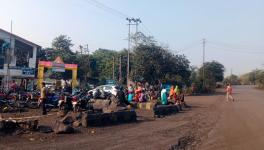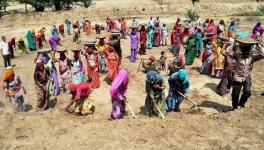Under Pandemic Cover, Atrocities Against Dalits Rising, say Activists
New Delhi: The novel coronavirus pandemic is more than just a health threat for India’s more marginalised, who are struggling with livelihood issues right since the sudden country-wide lockdown was announced from March 25.
This week in Jharkhand, two dalit youths were allegedly tied to a tree and thrashed by hundreds of villagers belonging to the upper caste Yadav community. They were reportedly made to lick their saliva allegedly for killing a goat in Giridih, a small town located near Ranchi.
While violence against the community has been prevalent since time immemorial, gory instances have resurfaced around the country in the past few weeks. Previously, a dalit couple attempted suicide after police beat them and destroyed their crops, causing outrage over the latest case of police brutality against marginalised sections of society.
An online video purportedly showing some police officers dragging and beating the couple with sticks to evict them from government-owned land in central Madhya Pradesh has been doing the rounds. As per reports, the body of a dalit woman belonging to the Nat community was taken off a funeral pyre by a group of men belonging to a dominant caste who said she could not be cremated on communal land in Agra.
More recently, on July 18, a dalit man named, Y Kiran Kumar, died in police custody in Chirala of Prakasam district in Andhra Pradesh. He was reportedly held for not wearing a mask. While the accused policemen were suspended and a probe was launched against them, activists are demanding that the accused must be booked under SC/ST Act. Activists have urged the National Commission for Scheduled Castes to intervene in the case and constitute a judicial probe.
While the cases of atrocities remain underreported, activists believe that the pandemic has aided the perpetuation of violence.
Pandemic-- a portal to violence?
In July this year, the increase in atrocities was flagged by the National Campaign on Dalit Human Rights. Intervening in more than 80 such cases, the campaign had stressed the need to draw the attention of the enforcement authorities and the judiciary on discrimination and atrocities against dalits.
The group stated: “Dalits have been discriminated against through social boycott and physical assault. Untouchability and physical abuse are rampant during the pandemic.” No heed was paid to this appeal as crimes continue unabated.
Speaking to NewsClick, Sukumar Naryana, professor of Social Exclusion at Delhi University, said: “The pandemic has become a reason to perpetuate violence, which used to be a part of the dalit household. The pandemic has created newer economic vulnerabilities, wherein the dalits are more desperate for food and labour. The police are not acting. What we see through these instances and what happened in Agra, the state is facilitating and aiding the act. The boy killed by a sub inspector in Andhra is because of the heinous attitude of the authorities towards the community.”
Adding that atrocities against dalits are growing each ear, Sukumar said: “In BJP-ruled states, the data indicates more impunity. If we were to look at the national crimes records data, atrocities are increasing every year, precisely because these communities are being targeted under religious and cultural dominance working with political pressures.”
Not filing cases under the SC/ST Act
Follow-up of cases of atrocities against the community has moved slower than normal during the pandemic, and the conviction rates under SC/ST (Prevention of Atrocities Act) stood at a mere 16.3% in 2017-18.
Speaking with NewsClick, Bhanwar Meghwanshi, an anti-caste activist, said: “The nature of atrocities is only getting cruel, it has not changed. Under the garb of the pandemic, atrocities are not being recorded but significantly increasing on the ground. To register a case under the Act is another task altogether. Unless you have the strength or the social capital to report it, the filing of the case remains a struggle.”
The struggle has been further amplified by legal hurdles. On July 26, the Rajasthan High Court directed its Registry to ensure that appeals preferred under the SC/ST Act are instituted only after the complainant/victim in the case is impleaded as a respondent party. This order meant that when there is a requirement to implead the victim, the victim may fear attribution of the litigation to them. As a result, they may not be willing to come forward.
Vidya Bhushan Rawat, an activist associated with the Bahujan Movement, said: “Constitutional provisions have aided atrocities against the dalit community. In the last five years, impunity has been given to atrocities against dalits. There is open support from backers of this government and some in the bureaucratic machinery. There is a clear case of victimising the victim, FIRs are being lodged against those who are complaining. This is most common across Rajasthan, Madhya Pradesh.”
He said while states such as Andhra Pradesh, collectivised efforts are on to implicate those responsible for the violence, for many others the attempt to register a complaint amidst the lockdown remains a struggle, let alone seeking justice.
Get the latest reports & analysis with people's perspective on Protests, movements & deep analytical videos, discussions of the current affairs in your Telegram app. Subscribe to NewsClick's Telegram channel & get Real-Time updates on stories, as they get published on our website.
























